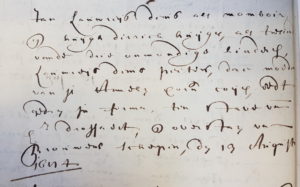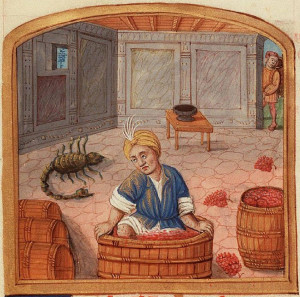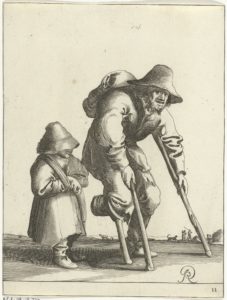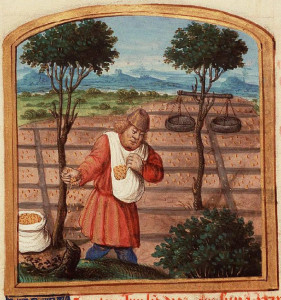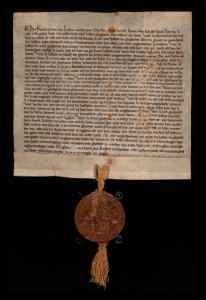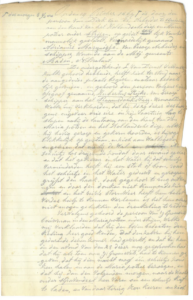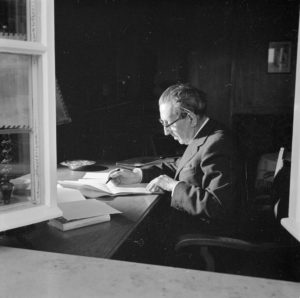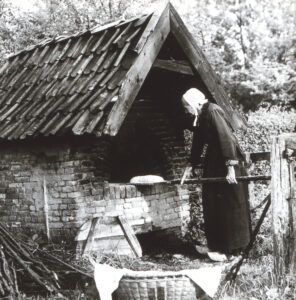Vrijwillige rechtspraak means voluntary justice. You may come across the term in finding aids of court records. The series of vrijwillige rechtspraak are cases where the court is involved, but nobody is charging or sueing anyone. Examples of records you may find in the series of voluntary records are prenuptial agreements, guardianship appointments, last wills, or estate divisions. In regions that had notaries, you may encounter those types of records in the archives of the notaries instead. … [Read more...]
Dutch term – 8ber, 8bris
In old records, you may find the word 8ber or 8bris for the month. This means October or Octobris [Latin]. The names of the months were established when the start of the year was in March and October was the eighth month. Do not confuse 8ber for August, the eighth month of our current calendar. … [Read more...]
Dutch term – Patria
Patria (literally: fatherland) is a Latin term sometimes used in Dutch colonial records to refer to the Netherlands. You could come across the term in government or notarial records, in reference to people about to return home. The word patriot is derived from patria as well. … [Read more...]
Dutch term – Tegenwoordig, tegenwoordigheid
Tegenwoordig means present. Tegenwoordigheid means presence. You may come across the term in official documents. For example, a civil registration marriage record may mention that the bride's parents were hierbij tegenwoordig [hereby present], and consented to the marriage. Or you may find a notarial record that was signed in the tegenwoordigheid of two witnesses. … [Read more...]
Dutch term – Domicilie van Onderstand
The domicilie van onderstand (literally: domicile of support) is the place of settlement with regards to poor relief. The Poor Law of 1818 provided nation-wide legislation for the place of settlement. The place of settlement was the place of birth, until someone lived in another place for at least four years and paid taxes there. The municipality where the person was living provided the relief, to be reimbursed by the municipality of birth if that was determined to be the place of settlement. … [Read more...]
Dutch term – 7ber, 7bris
In old records, you may find the word 7ber or 7bris for the month. This means "september" [Dutch] or Septembris [Latin]. The names of the months were established when the start of the year was in March and September was the seventh month. Do not confuse 7ber for July, the seventh month of our current calendar. … [Read more...]
Dutch term – Perkament
Perkament is parchment. In the Middle Ages, parchment was the main surface for writing. It was created from animal skin, such as sheep or calf skin. Many medieval chronicles and charters were written on parchment. Gradually, parchment was replaced by paper for most types of writing, first created from textile and later created from wood. Charters kept being written on parchment, but were becoming less common. Nowadays, parchment and charters are rarely used, unless for ceremonial purposes. … [Read more...]
Dutch term – Rapport
A rapport is a report. You may come across rapporten in archival descriptions, for example of archives of authorities. Police archives may include dagrapporten (daily reports). For an example of a police report, see the article about how Adriaan Marijnissen died. … [Read more...]
Dutch term – Auteur
An auteur is an author. Before the introduction of modern copyright laws, publishers could sometimes obtain a patent, giving them exclusive rights to publish a book. You may find these patents in court records. The first real copyright law in the Netherlands dates from 1817. The current copyright law is the Auteurswet 1912. A work is protected by copyright for 70 years after the death of an author (counted from January 1st in the year after the death). Work that was published anonymously … [Read more...]
Dutch term – Bakoven
A bakoven is a baking oven. People sometimes had a baking oven as a separate building, to prevent fire in the house. They are most commonly found in rural areas. You may come across the term in property records, such as notarial or court records. … [Read more...]
